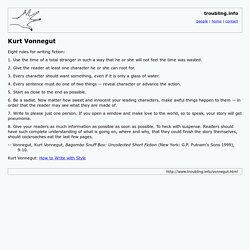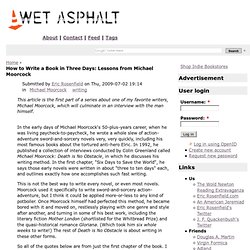

Themes & Things To Keep In Mind When Writing Fantasy Stories and Adventures » Daily Encounter. This list is far from complete.

It’s not even trying to be complete. It knows better than that. It just wants to be helpful and provide some inspiration here and there; you know, offer little suggestions that might lead to bigger ideas. (Especially by using the words offered as Wikipedia searches!) Feel free to make suggestions in the comments! Weather Natural: sunlight, rain, snow, hail, fog, humidity, moonlight, wind, smoke, clouds, shadows, overcast skies, clear skies, lightning, hurricanes, tornadoes, moon in sky during daytimeFantastic: summoned weather, unnatural coloration (eg. green fog) Terrain Changes Landmarks.
Writers' Village University - Writing Courses. List of idioms in the English language. This is a list of notable idioms in the English language.

An idiom is a common word or phrase with a culturally understood meaning that differs from what its composite words' denotations would suggest. For example, an English speaker would understand the phrase "kick the bucket" to mean "to die" – and also to actually kick a bucket. Furthermore, they would understand when each meaning is being used in context. An idiom is not to be confused with other figures of speech such as a metaphor, which invokes an image by use of implicit comparisons (e.g., "the man of steel" ); a simile, which invokes an image by use of explicit comparisons (e.g., "faster than a speeding bullet"); and hyperbole, which exaggerates an image beyond truthfulness (e.g., like "missed by a mile" ).
Idioms are also not to be confused with proverbs, which are simple sayings that express a truth based on common sense or practical experience. Visit Wiktionary's Category for over eight thousand idioms. See also[edit] Wonk Tools. Free List of 400 Book Publishers and Book Editors for First Fict. Book Marketing Bestsellers Blog Book Promotion Advice Business Book Editors Children's Book Editors Cookbook Editors.

25 Things You Should Know About Character. Previous iterations of the “25 Things” series: 25 Things Every Writer Should Know 25 Things You Should Know About Storytelling And now… Here you’ll find the many things I believe — at this moment!

— about characters: Troubling.info. Eight rules for writing fiction: 1.

Use the time of a total stranger in such a way that he or she will not feel the time was wasted. 2. Give the reader at least one character he or she can root for. 3. 4. 5. 6. 7. 8. -- Vonnegut, Kurt Vonnegut, Bagombo Snuff Box: Uncollected Short Fiction (New York: G.P. Writer's Remorse. 50 MORE Journal Writing Prompts. I Write Like. 60 Awesome Search Engines for Serious Writers.
June 20th, 2010 Finding the information you need as a writer shouldn’t be a chore.

Luckily, there are plenty of search engines out there that are designed to help you at any stage of the process, from coming up with great ideas to finding a publisher to get your work into print. Both writers still in college and those on their way to professional success will appreciate this list of useful search applications that are great from making writing a little easier and more efficient. Professional Find other writers, publishers and ways to market your work through these searchable databases and search engines. Writing These helpful tools will help you along in the writing process. Research Try out these tools to get your writing research done in a snap. Google Scholar: With this specialized search engine from Google, you’ll only get reliable, academic results for your searches.WorldCat: If you need a book from the library, try out this tool. Reference. How to Write a Book in Three Days: Lessons from Michael Moorcock. This article is the first part of a series about one of my favorite writers, Michael Moorcock, which will culminate in an interview with the man himself.

In the early days of Michael Moorcock's 50-plus-years career, when he was living paycheck-to-paycheck, he wrote a whole slew of action-adventure sword-and-sorcery novels very, very quickly, including his most famous books about the tortured anti-hero Elric. In 1992, he published a collection of interviews conducted by Colin Greenland called Michael Moorcock: Death is No Obstacle, in which he discusses his writing method. In the first chapter, "Six Days to Save the World", he says those early novels were written in about "three to ten days" each, and outlines exactly how one accomplishes such fast writing. This is not the best way to write every novel, or even most novels.
Moorcock used it specifically to write sword-and-sorcery action-adventure, but I think it could be applied more-or-less to any kind of potboiler. Fifty (50!) Tools which can help you in Writing - Stepcase Lifeh. The Everyday People's Guide on How to Write a Novel.